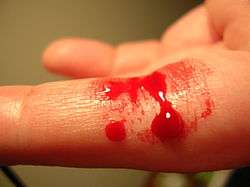Definify.com
Webster 1913 Edition
Bleed
Bleed
,Verb.
I.
[
imp. & p. p.
Bled
; p. pr. & vb. n.
Bleeding
.] [OE.
bleden
, AS. bl[GREEK]dan
, fr. bl[GREEK]d
blood; akin to Sw. blöda
, Dan. blöde
, D. bloeden
, G. bluten
. See Blood
.] 1.
To emit blood; to lose blood; to run with blood, by whatever means;
as, the arm
. bleeds
; the wound bled
freely; to bleed
at the nose2.
To withdraw blood from the body; to let blood;
as, Dr. A.
. bleeds
in fevers3.
To lose or shed one’s blood, as in case of a violent death or severe wounds; to die by violence.
“Cæsar must bleed.” Shak.
The lamb thy riot dooms to
bleed
to-day. Pope.
4.
To issue forth, or drop, as blood from an incision.
For me the balm shall
bleed
. Pope.
5.
To lose sap, gum, or juice;
as, a tree or a vine
. bleeds
when tapped or wounded6.
To pay or lose money; to have money drawn or extorted;
as, to
. bleed
freely for a cause[Colloq.]
To make the heart bleed
, to cause extreme pain, as from sympathy or pity.
Bleed
,Verb.
T.
1.
To let blood from; to take or draw blood from, as by opening a vein.
2.
To lose, as blood; to emit or let drop, as sap.
A decaying pine of stately size,
bleeding
amber. H. Miller.
3.
To draw money from (one); to induce to pay;
as, they
. bled
him freely for this fund[Colloq.]
Webster 1828 Edition
Bleed
BLEED
,Verb.
I.
1.
To lose blood; to run with blood, by whatever means; as, the arm bleeds.2.
To die a violent death, or by slaughter.The lamb thy riot dooms to bleed to day.
3.
To issue forth, or drop as blood, from an incision; to lose sap, gum or juice; as, a tree or a vine bleeds.For me the balm shall bleed.
The heart bleeds, is a phrase used to denote extreme pain from sympathy or pity.
BLEED
,Verb.
T.
Definition 2026
bleed
bleed
English

A bleeding wound on a finger.
Verb
bleed (third-person singular simple present bleeds, present participle bleeding, simple past and past participle bled)
- (intransitive, of an animal) To lose blood through an injured blood vessel.
- If her nose bleeds, try to use ice.
- (transitive) To let or draw blood from.
- (transitive) To take large amounts of money from.
- (transitive) To steadily lose (something vital).
- The company was bleeding talent.
- (intransitive, of an ink or dye) To spread from the intended location and stain the surrounding cloth or paper.
- (transitive) To remove air bubbles from a pipe containing fluids.
- (obsolete, transitive) To bleed on; to make bloody.
- 1485, Sir Thomas Malory, Le Morte d’Arthur, volume I, book VIII:
- And so Sir Trystrames bledde bothe the over-shete and the neyther-shete, and the pylowes and the hede-shete
- 1485, Sir Thomas Malory, Le Morte d’Arthur, volume I, book VIII:
- (intransitive, copulative) To show one's group loyalty by showing (its associated color) in one's blood.
- He was a devoted Vikings fan: he bled purple.
- To lose sap, gum, or juice.
- A tree or a vine bleeds when tapped or wounded.
- To issue forth, or drop, like blood from an incision.
- Alexander Pope
- For me the balm shall bleed.
- Alexander Pope
- (phonology, transitive, of a phonological rule) To destroy the environment where another phonological rule would have applied.
- Labialization bleeds palatalization.
Derived terms
Derived terms
Translations
lose blood
|
|
draw blood
Noun
bleed (plural bleeds)
- An incident of bleeding, as in haemophilia.
- (printing) A narrow edge around a page layout, to be printed but cut off afterwards (added to allow for slight misalignment, especially with pictures that should run to the edge of the finished sheet).
- (sound recording) The situation where sound is picked up by a microphone from a source other than that which is intended.
Translations
References
- bleed in The Century Dictionary, The Century Co., New York, 1911
- bleed in Webster’s Revised Unabridged Dictionary, G. & C. Merriam, 1913